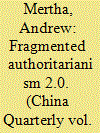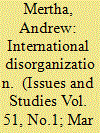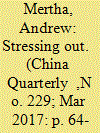| Srl | Item |
| 1 |
ID:
093235


|
|
|
|
|
| Publication |
2009.
|
| Summary/Abstract |
Traditional analyses of political liberalization in China focus on elections or other facets of democratization. But they cannot account for the fact that although China remains authoritarian, it is nevertheless responsive to the increasingly diverse demands of Chinese society. I argue that the rules of the policy-making process are still captured by the fragmented authoritarianism framework, but that the process has become increasingly pluralized: barriers to entry have been lowered, at least for certain actors (hitherto peripheral officials, non-governmental organizations and the media) identified here as "policy entrepreneurs." With policy change as the variable of interest, I compare three cases of hydropower policy outcomes. I argue that policy entrepreneurs' ability to frame the issue effectively explains variation in hydropower policy outcomes. I then extend these findings to an unlikely policy area, international trade, specifically, the 2001-06 Sino-EU trade talks over child-resistant lighter safety regulations.
|
|
|
|
|
|
|
|
|
|
|
|
|
|
|
|
| 2 |
ID:
138154


|
|
|
|
|
| Summary/Abstract |
Observers of China take for granted that Chinese domestic politics are highly fragmented. At the same time, they tend to relax these assumptions when analyzing China as an international actor. The thesis of this article is that domestic institutional fragmentation in Chinese bureaucratic politics carries over into its international behavior. Using the historical case of Chinese foreign assistance to Democratic Kampuchea, this article demonstrates that the effectiveness of Chinese foreign aid—and the influence that comes with it—is only as good as the domestic institutions that manage the bilateral relationship. This has implications for understanding the veracity of Chinese global influence today as well as refocusing attention to the domestic constraints on Beijing’s international behavior.
|
|
|
|
|
|
|
|
|
|
|
|
|
|
|
|
| 3 |
ID:
066356


|
|
|
| 4 |
ID:
151577


|
|
|
|
|
| Summary/Abstract |
Might authoritarian one-party systems experience something akin to party identification – or affective proximity to the Party – that waxes and wanes over time? Such cycles do not centre on elections but on the politics of succession, new policy initiatives and ad hoc housecleaning, and their focus would be officials within the system as opposed to the electorate outside it. I argue that a key mechanism animating such variation in party identification of Chinese Communist Party (CCP) cadres lies within the recurring rectification efforts seeking to temper these individuals and make them more submissive to the larger political goals of the Party centre. Such priming is largely an in-house phenomenon, taking place increasingly deeper within the CCP apparatus. This process tends to involve an extensive arsenal of institutional mechanisms that constitute a particularly big stick and within which pressures to comply can be uncomfortable, even excruciating. Normative elements of these movements, such as the language and substantive written materials used during study, analysis and self-criticism are predominantly in the service of enhancing the sheer domineering quality of the Party vis-à-vis the individuals that make up its ranks. I explore this through an examination of the three stresses (san jiang) campaign of 1998–2002.
|
|
|
|
|
|
|
|
|
|
|
|
|
|
|
|